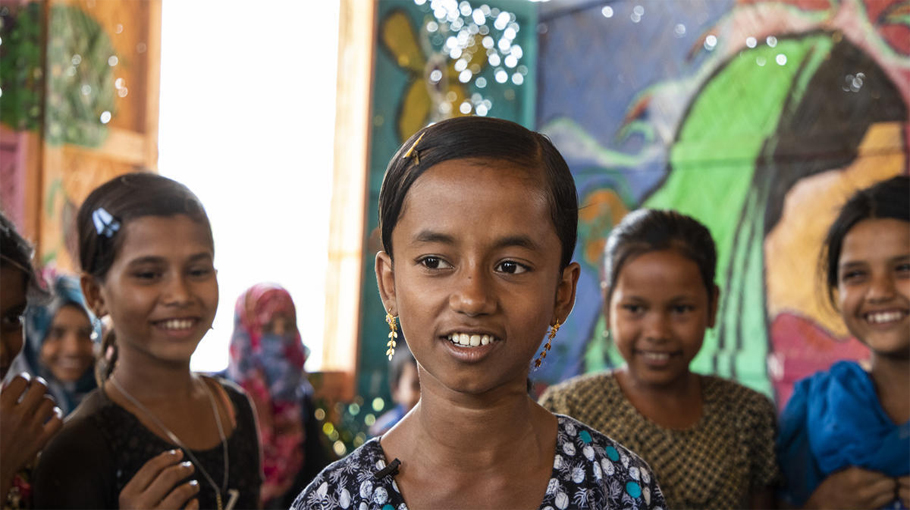Rohingya refugee children: Voices of resilience, agents of transformation

“Small acts when multiplied by millions can change the world.”
Vanessa Nakate, Climate Justice Advocate and UNICEF Goodwill Ambassador Rohingya refugee children can be wrought as the changemakers of tomorrow by playing significant roles in future societal developments in Bangladesh.
Bangladesh hosts over one million Rohingya refugees from Myanmar, making it one of the largest protracted refugee situations in the world of whom one out of three is a school-aged child. If we can make these large numbers of children as change makers of tomorrow it can bring a significant change in the societal development in Bangladesh.
Migrant and displaced children face numerous challenges such as violence, abuse, exploitation, or discrimination, and miss out on education and proper medical care. These difficulties have lasting physical and psychological effects and prevent children on the move from reaching their full potential.
Moreover, the impacts of the climate crisis and environmental degradation on these marginalized young children’s lives and well-being cause them to fall behind in contributing to the development personally as well as socially.
Neglecting Rohingya refugee children can pose significant social harms and threats to Bangladesh, including increased Crime and Violence, Social unrest, Intergenerational Poverty and Marginalization, and Child Exploitation.
Neglected children, especially those who feel hopeless and marginalized, are more susceptible to radical ideologies. This can lead to the formation of extremist groups within the refugee population, posing a significant security threat to Bangladesh and the region.
Addressing these issues through comprehensive support programs, including education, healthcare, and social integration initiatives, is essential to mitigate these social harms and threats, ensuring the well-being of both the refugees and Bangladesh.
Despite having so many limitations these Rohingya children can be used as change-makers in Bangladesh. Empowered Rohingya youth can become leaders within their communities, advocating for improvements in healthcare, education, and social services. Their initiatives can lead to better living conditions for both refugees and residents.
When refugee children are given opportunities to thrive, they can help bridge gaps between the refugee and host communities. This can reduce tensions and foster a sense of unity and mutual respect.
Young minds often bring fresh perspectives and innovative solutions to problems. Encouraging Rohingya children to pursue education and creative endeavors can lead to new ideas and projects that benefit the broader society.
Having faced significant hardships, Rohingya children often develop resilience and adaptability. These qualities can be harnessed to help build stronger, more resilient communities capable of overcoming future challenges.
Children's brains are highly plastic and capable of significant growth and learning. During their formative years, they develop cognitive, emotional, and social skills that lay the foundation for their future behavior and decision-making.
According to Bandura's Social Learning Theory, children learn behaviors, values, and norms by observing and imitating others, especially role models. When children are exposed to positive role models who demonstrate leadership and social responsibility, they are more likely to adopt these traits and become changemakers themselves.
Now it is our time to establish a world in which every child is a change agent.
There are a few ways how we can unleash the power of play to form young agents of change in our community:
Understand Bangladeshi community
To build a connection with Rohingya refugee children, it is imperative to understand the unique context framing their perspective. It is mandatory to engage with them and other community members, visit refugee camps and community centers, and learn more about the daily problems they face and the solutions they come up with. Learning with our community will allow them to develop a shared vision of what needs to change. Get started!
Rising civic value
Promoting civic values – such as teamwork, empathy, respect, tolerance, responsibility, fair play, and inclusion – is most effective for making them change-makers in the society. Many organizations working with Rohingya refugees may welcome the assistance and support of community volunteers to work with children. Local NGOs, international aid organizations, or the community may take this initiative, Get Moving
Many Rohingya refugee children face nutritional challenges and lack opportunities for physical activity. Encouraging physical activities and healthy habits is crucial. Technology and limited space in refugee camps often restrict outdoor play. Creating safe spaces for children to engage in physical activities can significantly improve their health and well-being.
"Rohingya refugee children want to learn, and to turn their hopes and dreams for a better future to actual potential," said Sheldon Yett, UNICEF Representative to Bangladesh. Let's start today, and more specifically right now, by including them with our children as agents of change. Together, we can work towards a future where everyone is seen as an asset, contributing to a better Bangladesh.
The writer is a Senior Human resources manager at Uttara Crescent Hospital & Former Lecturer at South
East University



